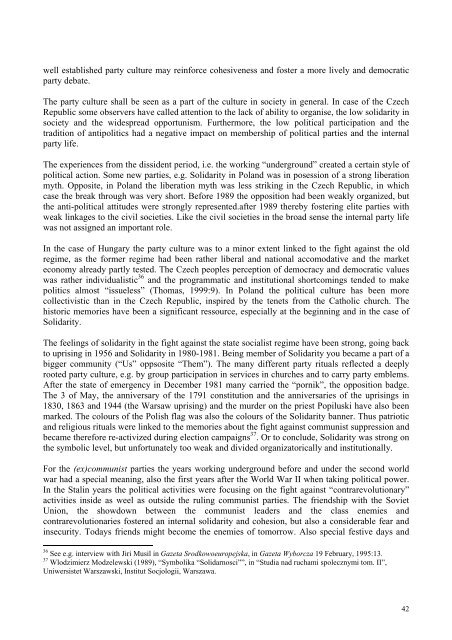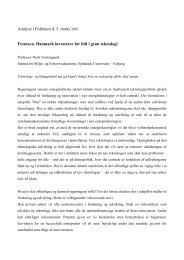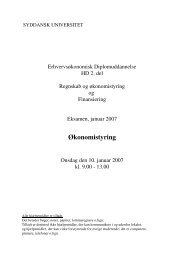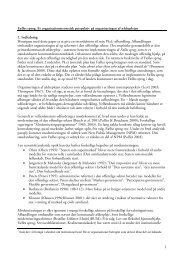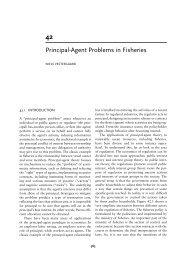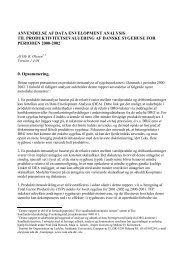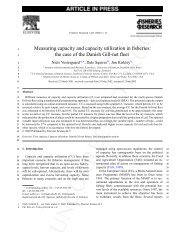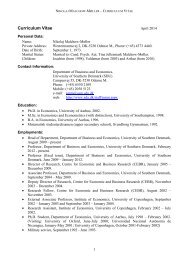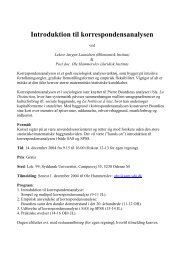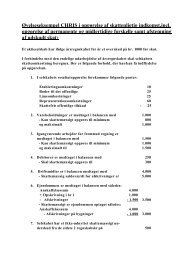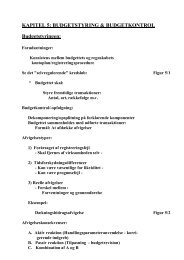Development of Parties and Party Systems in ... - lah@sam.sdu.dk
Development of Parties and Party Systems in ... - lah@sam.sdu.dk
Development of Parties and Party Systems in ... - lah@sam.sdu.dk
- No tags were found...
You also want an ePaper? Increase the reach of your titles
YUMPU automatically turns print PDFs into web optimized ePapers that Google loves.
well established party culture may re<strong>in</strong>force cohesiveness <strong>and</strong> foster a more lively <strong>and</strong> democraticparty debate.The party culture shall be seen as a part <strong>of</strong> the culture <strong>in</strong> society <strong>in</strong> general. In case <strong>of</strong> the CzechRepublic some observers have called attention to the lack <strong>of</strong> ability to organise, the low solidarity <strong>in</strong>society <strong>and</strong> the widespread opportunism. Furthermore, the low political participation <strong>and</strong> thetradition <strong>of</strong> antipolitics had a negative impact on membership <strong>of</strong> political parties <strong>and</strong> the <strong>in</strong>ternalparty life.The experiences from the dissident period, i.e. the work<strong>in</strong>g “underground” created a certa<strong>in</strong> style <strong>of</strong>political action. Some new parties, e.g. Solidarity <strong>in</strong> Pol<strong>and</strong> was <strong>in</strong> posession <strong>of</strong> a strong liberationmyth. Opposite, <strong>in</strong> Pol<strong>and</strong> the liberation myth was less strik<strong>in</strong>g <strong>in</strong> the Czech Republic, <strong>in</strong> whichcase the break through was very short. Before 1989 the opposition had been weakly organized, butthe anti-political attitudes were strongly represented.after 1989 thereby foster<strong>in</strong>g elite parties withweak l<strong>in</strong>kages to the civil societies. Like the civil societies <strong>in</strong> the broad sense the <strong>in</strong>ternal party lifewas not assigned an important role.In the case <strong>of</strong> Hungary the party culture was to a m<strong>in</strong>or extent l<strong>in</strong>ked to the fight aga<strong>in</strong>st the oldregime, as the former regime had been rather liberal <strong>and</strong> national accomodative <strong>and</strong> the marketeconomy already partly tested. The Czech peoples perception <strong>of</strong> democracy <strong>and</strong> democratic valueswas rather <strong>in</strong>dividualistic 36 <strong>and</strong> the programmatic <strong>and</strong> <strong>in</strong>stitutional shortcom<strong>in</strong>gs tended to makepolitics almost “issueless” (Thomas, 1999:9). In Pol<strong>and</strong> the political culture has been morecollectivistic than <strong>in</strong> the Czech Republic, <strong>in</strong>spired by the tenets from the Catholic church. Thehistoric memories have been a significant ressource, especially at the beg<strong>in</strong>n<strong>in</strong>g <strong>and</strong> <strong>in</strong> the case <strong>of</strong>Solidarity.The feel<strong>in</strong>gs <strong>of</strong> solidarity <strong>in</strong> the fight aga<strong>in</strong>st the state socialist regime have been strong, go<strong>in</strong>g backto upris<strong>in</strong>g <strong>in</strong> 1956 <strong>and</strong> Solidarity <strong>in</strong> 1980-1981. Be<strong>in</strong>g member <strong>of</strong> Solidarity you became a part <strong>of</strong> abigger community (“Us” oppsosite “Them”). The many different party rituals reflected a deeplyrooted party culture, e.g. by group participation <strong>in</strong> services <strong>in</strong> churches <strong>and</strong> to carry party emblems.After the state <strong>of</strong> emergency <strong>in</strong> December 1981 many carried the “pornik”, the opposition badge.The 3 <strong>of</strong> May, the anniversary <strong>of</strong> the 1791 constitution <strong>and</strong> the anniversaries <strong>of</strong> the upris<strong>in</strong>gs <strong>in</strong>1830, 1863 <strong>and</strong> 1944 (the Warsaw upris<strong>in</strong>g) <strong>and</strong> the murder on the priest Popiluski have also beenmarked. The colours <strong>of</strong> the Polish flag was also the colours <strong>of</strong> the Solidarity banner. Thus patriotic<strong>and</strong> religious rituals were l<strong>in</strong>ked to the memories about the fight aga<strong>in</strong>st communist suppression <strong>and</strong>became therefore re-activized dur<strong>in</strong>g election campaigns 37 . Or to conclude, Solidarity was strong onthe symbolic level, but unfortunately too weak <strong>and</strong> divided organizatorically <strong>and</strong> <strong>in</strong>stitutionally.For the (ex)communist parties the years work<strong>in</strong>g underground before <strong>and</strong> under the second worldwar had a special mean<strong>in</strong>g, also the first years after the World War II when tak<strong>in</strong>g political power.In the Stal<strong>in</strong> years the political activities were focus<strong>in</strong>g on the fight aga<strong>in</strong>st “contrarevolutionary”activities <strong>in</strong>side as weel as outside the rul<strong>in</strong>g communist parties. The friendship with the SovietUnion, the showdown between the communist leaders <strong>and</strong> the class enemies <strong>and</strong>contrarevolutionaries fostered an <strong>in</strong>ternal solidarity <strong>and</strong> cohesion, but also a considerable fear <strong>and</strong><strong>in</strong>security. Todays friends might become the enemies <strong>of</strong> tomorrow. Also special festive days <strong>and</strong>36 See e.g. <strong>in</strong>terview with Jiri Musil <strong>in</strong> Gazeta Sro<strong>dk</strong>owoeuropejska, <strong>in</strong> Gazeta Wyborcza 19 February, 1995:13.37 Wlodzimierz Modzelewski (1989), “Symbolika “Solidarnosci””, <strong>in</strong> “Studia nad ruchami spolecznymi tom. II”,Uniwersistet Warszawski, Institut Socjologii, Warszawa.42


